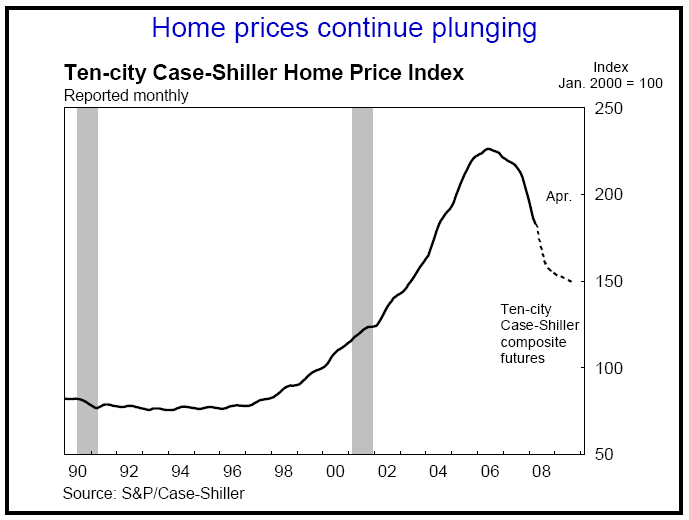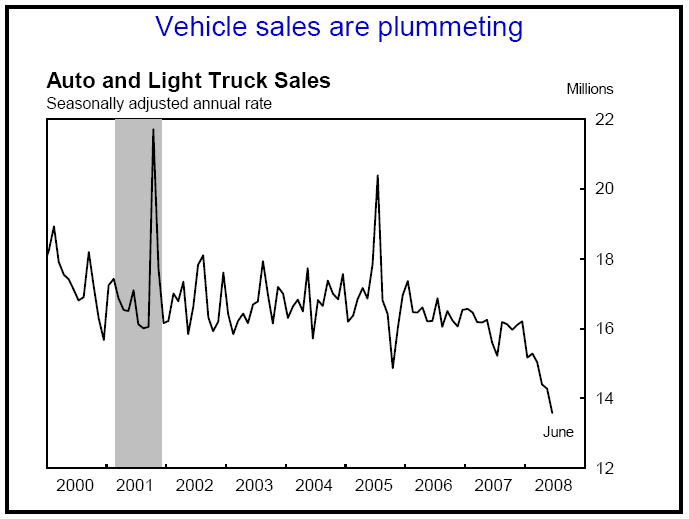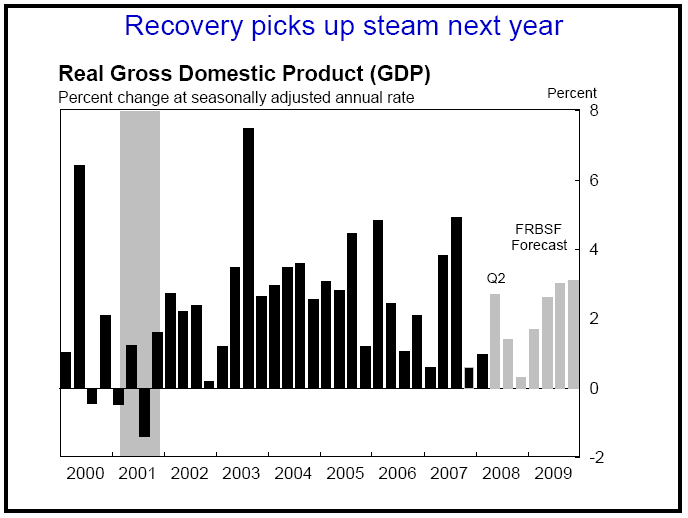At least that’s the assessment of Federal Reserve Bank of San Francisco economist John Fernald (hat tip: Mark Thoma).
We’ve commented before that housing futures signal further price declines.

|
We also know that the auto sector has been hit hard.

|
Notwithstanding, the tax stimulus likely kept consumption spending growing this quarter, and Fernald is expecting a reasonably good number for 2008:Q2 real GDP growth.

|
But Fernald anticipates a return to anemic growth rates for 2008:H2.
Technorati Tags: GDP,
housing,
recession,
macroeconomics,
economics,
autos
I wonder if there’s not a fallacy of composition in looking at the 10 city home price index: the fall in home prices isn’t distributed uniformly across the country. Are there any cases among major cities in which the recent dip in prices wasn’t preceded by a sharp rise?
Here in Chicago for example we’ve seen a less than 10 percent drop but, then, housing prices haven’t risen 10% a year every year for the last eight years, either.
OK, now it seems that H2-2008 might be “stag-flat”.
But there’s an upside risk:
a massive sell-off of commodities (really not so likely now, but more likely than 15 days ago…).
That commodities sell-off would probably lower the long term interest rate on mortgages which in turn would diminish the high pressure on the residential market.
“That commodities sell-off would probably lower the long term interest rate on mortgages which in turn would diminish the high pressure on the residential market”
Nope, just the opposite. Commodities selloff will signifigently drop US industrial production and lift rates.
This is a WAY different system than you remember. Matter of fact, you could argue a dollar collapse will end up deflationary rather than infationary over a longer period as the export-import system would collapse leading to massive debt deflation as yields ramp as exporters lose the ability to suppress rates.
So that is a pretty decent 2009 recovery, that they are expecting.
This was the first recession to not have a single quarter of negative GDP growth.
Dave Schuler’s statement that there has only been a 10% price drop in Chicagoland is flawed. Even if nominal mdeian selling prices have declined only 10%, the number of homes being sold at those prices is down about 50% from bubble peak — so those aren’t market-clearing prices. In the northwest suburbs, there is 1 to 1-1/2 years of inventory on the market at current sales rates. The reason the price decline appears less than actual is that most sellers are in a state of denial. Also, it seems that the foreclosure process takes so long here that the number of homes that have made it to bank REO status is still only a fraction of what it soon will be.
Shouldn’t the GDP numbers be adjusted for inflation?
Oh, it’s already adjusted. My bad :]
Pre-emptively: The American Physical Society has in no way changed its position on global warming, which was:
“The evidence is incontrovertible: Global warming is occurring. If no mitigating actions are taken, significant disruptions in the Earths physical and ecological systems, social systems, security and human health are likely to occur. We must reduce emissions of greenhouse gases beginning now.”
and now:
“The American Physical Society reaffirms the following position on climate change, adopted by its governing body, the APS Council, on November 18, 2007”
One twit abused his position to present his opinion and that of a British crank with apparently no scientific training as somehow mainstream. It’s not.
The right wing lie machine picked this up and propagated it far and wide, completely reckless of the truth.
This is one of those events that make it clear to me that the right-wing has become simply locusts, Neros destroying out of a love of destruction.
I’m just comparing apples to apples. You’re comparing apples (Case-Shiller indices) to oranges (some other unknown measure that includes time on market, etc.)
If you’d prefer comparing oranges to oranges, that’s fine. What are the comparable figures, using your method of measurement, for the ten cities of the 10 City Case-Shiller Index cited above?
Jim-
I think the Case-Shiller index overstated the rise and now is overstating the decline. Truck sales have obviously been hurt by increase in gas price.
I do think GK is on to something. Maybe recessions need to redefined upwards. We have higher standards now.
GM and Chrysler are quite likely to be goners without bailouts. Ford has the best possibility of a turn-around simply because they have a small car that’s at least mediocre. They’re just as stupidly reliant on big trucks, in other words, but at least have an exit plan which isn’t laughable.
I’m sure the dude from the GM dealership will be here any minute to tell us how things are turning up, though.
Comment about the Real Gross National Product
I have a few comments regarding the Fed’s projection of GDP recovery in 2009:
The wonderful thing about my new “REALISTIC GDP GROWTH RATE” definition, is that it clearly signals when the nation is impoverishing itself. Over the long run, when America borrows at a faster rate than its economy expands, its citizens’ standard of living will decline as debt servicing consumes an ever increasing proportion of production.
Just when I think the comments section of this site couldn’t get any more outlandish, along come Charles and MarkS.
Since last month, markets have pared back expectations about the pace of monetary-policy tightening. A month ago, markets thought the federal funds rate would rise steadily over the course of 2008. They now expect only one rate increase this year.
This just about sums it up in Fernald’s paper. The Federal Reserve really has nothing to do with any of this. I mean, look, it is expectations of monetary-policy tightening not the actual loose money policies of the FED or the interest rate overreaction just to prove that they are there. Actually the FED has no reason for being except to pay me a high salary to justify their existence without actually giving them any responsibility.
This is such a joke from someone who should be telling us why and what will correct it not just reporting as if it all just happened in some mystical way.
RE:”This was the first recession to not have a single quarter of negative GDP growth.”
Sarcasm? If so, I feel the same way. All anticipation, no incidence. Like the effects of global warming, it sits on the media horizon, constantly threatening relevance and anguish. maybe it will kick down the door and break your toys, maybe it will sleep a while.
The reason it’s possible to escape a single negative GDP this time: Exports. Oh, it already feels and will feel like a recession. I’m just saying that we may never actually get “the print.”